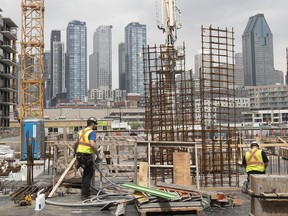To get ahead, sometimes you need government to get out of the way. On that score, Quebec fares poorly among provinces.

Quebecers who want to improve their lot in life should be able to do so without having the government stand in their way.
Whether by applying for a new job that allows you to make better use of your skills, by following certain training programs, or by modifying your work schedule in mutual agreement with your employer, you should be able to take the steps needed to raise your living standards, if that’s what you want to do.
Yet in Quebec, the government too often strews obstacles in the path of those who try to improve their material conditions.
This becomes clear when looking at Statistics Canada’s data on mobility between different income deciles. This concept, known as relative mobility, refers to the ability of individuals to move between income strata over the course of their lives.
It has long been the case that the least fortunate 10 per cent of Quebecers tend to remain in this situation longer than those who are in the same position in Canada’s other large provinces.
Yet these Quebecers are no less hardworking than their counterparts in Alberta, British Columbia or Ontario. The difference, rather, comes from the ways in which their provincial and municipal governments either discourage or encourage their professional flourishing.
Think, for instance, of the need for licences to practise certain trades, of the weight of the tax burden, or of the space the government leaves for the private sector to develop. By all these metrics, Quebec is near the bottom of the pack, if not dead last, among Canadian provinces, leading to this lower mobility between income levels.
For purposes of illustration, take taxation.
It’s no secret: Quebecers have the unhappy distinction of being the most heavily burdened taxpayers on the continent. The tax burden in Quebec was a whopping 38.9 per cent of GDP in 2022. Over the past 40 years, Quebec always had a higher tax burden than the rest of Canada, but the gap has widened, now standing at 6.1 percentage points.
This high level of taxation is due to Quebec having the highest level of government spending in the country. Total government spending in the province as a percentage of GDP in 2022 was nearly 10 percentage points higher than in Ontario, 14 percentage points higher than in British Columbia, and nearly double that of Alberta.
The result is that once the taxman has passed, we have less money left in our pockets to finance our projects — whether to buy a house, obtain a diploma, or launch a new business.
In certain cases, such projects are just put off by a few years, thus delaying their individual and societal benefits. In other cases, the projects are abandoned altogether.
This is just one example of the ways in which government intervention — well-intentioned or not — ends up acting as a drag on the socioeconomic rise of individuals.
Another example is mandatory occupational licensing. Excessive regulation of workers in the construction sector poses a barrier to entry for many Quebecers on the lower end of the income scale. Quebec construction workers are the most regulated in Canada.
Someone trying to improve their lot in life through construction work will have an easier time doing so in other provinces, where many trades are open to everyone, without the steep requirement of completing hundreds of hours of schooling.
Sometimes the best thing government can do to help is to get out of the way, by removing regulation and leaving more money in taxpayers’ pockets. The prospect of upward mobility is the true sign of a thriving society, as it means citizens are free and able to pursue their own goals.
Gabriel Giguère is a senior public policy analyst and Vincent Geloso is a senior economist at the Montreal Economic Institute (MEI).